SCUBAPRO Deep Elite Team - Amber Jackson & Emily Hazelwood
Amber Jackson & Emily Hazelwood
Amber's Profession: Oceanographer, Environmental Scientist, Explorer and Entrepreneur
Emily's Profession: Co-Founder of Blue Latitudes, Marine Conservation Biologist, and Explorer
Amber - Diver Since: 2011
Emily - Diver Since: 2002
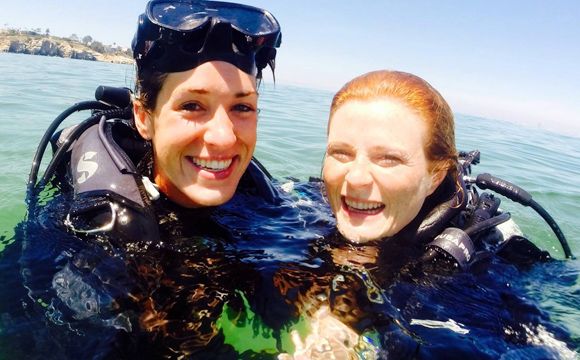
An Interview with Amber & Emily:
Can you tell us about yourself?
AMBER: Growing up in Laguna Beach, California, the tidal zone was the only playground I cared for. In local tide pools, my siblings and I could often be found turning over rocks and jumping through blowholes. The ocean remained a constant in my life, calling me to her like so many before me. In high school, I took a marine ecology class and started volunteering at the Dana Point Institute of Oceanography. It is here, while trawling for surface diatoms and examining them under microscopes and walking along the rocky intertidal to count sea urchins, that my interests in the ocean developed into a scholastic passion. Attending UC Berkeley and Scripps Institution of Oceanography afforded me the opportunity to channel this academic curiosity into a life long career in ocean exploration.
I am Co-Founder of Blue Latitudes, based in La Jolla, California. Blue Latitudes unites science, policy, and communication to create innovative solutions for the complex ecological challenges associated with offshore structures. Our current mission in California is to re-purpose the offshore oil and gas platforms as artificial reefs.
EMILY: I grew up on a tiny island off of New Hampshire, which meant I grew up with a fascination and love for the sea. My afternoons were filled with trips to the nearby tidepools and days at the beach. I am fortunate that I come from a family of divers, that, from a young age supported my passion and curiosity for the sea, even if that meant making room for a variety marine collections I would bring home in sea-water filled buckets.
I am a Co-Founder of Blue Latitudes, based in La Jolla, California. Blue Latitudes unites science, policy, and communication to create innovative solutions for the complex ecological challenges associated with offshore structures. Our current mission in California is to re-purpose the offshore oil and gas platforms as artificial reefs.
What got you started in diving?
AMBER: When I graduated from UC Berkeley with a degree in Marine Science, I fled to Catalina Island to work a boy scout camp over the summer. Tired of the classroom, and rigors of University, I spent every free moment snorkeling in the famous Catalina kelp. My good friend, and snorkel buddy, Mitch A., convinced me to dive deeper and get certified. So I did, right there at the boy scout camp. I've been hooked every since, and been fortunate to intertwined diving into my career.
EMILY: I was fortunate that both my parents fostered my love of the sea by getting my brother and I certified at a young age and taking us around the world to explore different ocean ecosystems. Every site we visited gave us the opportunity to ravenously research the different creatures that lived there, and attempt to identify them during our dives. This passion to explore all of the world's ocean has persisted with me to this day- drawing me to places like the tiny island of Utila in search of whale sharks, to oil platforms in the heart of the Gulf of Mexico, to searching for Wobbegons and Leafy Sea Dragons off the coast of Sydney, Australia.
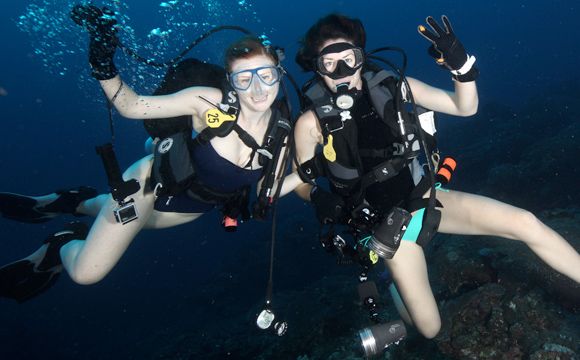
What does diving mean to you?
AMBER: Diving brings me to the moment, strengthens my friendships, and is my portal for exploration.
EMILY: Diving for me offers the opportunity to 'live in the moment'. Beneath the waves, the worries and stress that exist on the surface slip away and I am faced with an incredible opportunity to explore new worlds. The ocean is such a large part of who I am and everyday I am inspired by it to continue to pursue my passions, and seek new ways to preserve the biodiversity of life found there.
How has diving changed your life?
AMBER: Diving is the means through which I can be as close as possible to the ocean. The subsequent inspiration from my experiences underwater have forever shaped my life towards one goal, giving a voice to the value of a healthy ocean.
EMILY: Diving has changed my life in that it has not only broadened my horizons, but it has allowed me to fuel my imagination and sense of wonder. Diving has shaped the direction my life has taken, from my education, to creating meaningful connections, to chasing the career of my dreams.
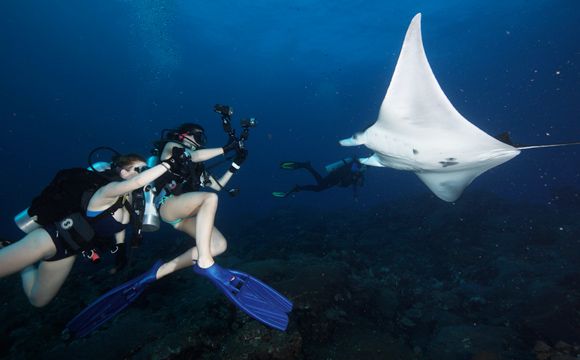
What kind of diving do you like to do?
AMBER: I love to dive with a camera and a purpose.
EMILY: There is not a type of diving that I don't enjoy. However, my favorite dives have been those that included spending time with those closest to me.
Where are some of your favorite places to dive?
AMBER: My favorite place to dive is in the Kelp Forest. I feel safe, at home and in awe of the towers of kelp fronds and the life that calls that ecosystem home.
EMILY: One of my favorite locations for diving would be French Polynesia, I visited the islands with my dad and we had the opportunity to explore an area where much of the ecosystems are untouched, which meant lots of sharks, hundreds of them in fact! Beyond the beautiful reefs and spectacular animals however, this trip was a special opportunity for me to share in one of my greatest passions with someone who means so much to me, my dad. My other favorite locations would of course include the California offshore platforms, home to one of the most productive, and unexpected ecosystems on the planet, and the kelp forests we have here. Swimming through a kelp forest is like swimming through Acadia National Park- except instead of being surrounded by pine trees, you are surrounded by kelp- up to 60 ft in length!
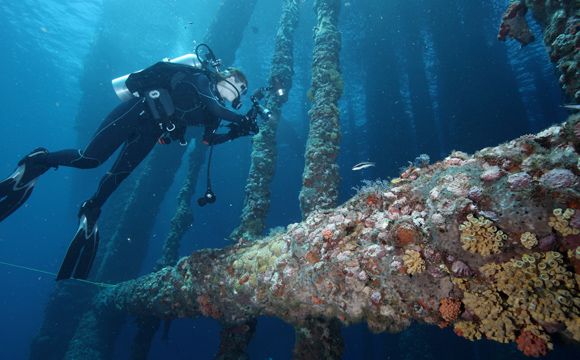
If you had to pick your most amazing experience under water, what would it be?
AMBER: Biofluorescent and bioluminescent encounters are ones difficult to capture on camera, but they are unforgettable.
EMILY: Probably the most memorable experience I have had to date (and one that never gets old no matter how many times I dive the platforms) would be the first time I rolled backwards off the boat up in Santa Barbara, and plunged into the pacific to witnesses my first platform underwater on scuba. Except, I wasn't looking at an oil platform, I was looking at a living breathing reef- one that was the size of the empire state building! I truly was stunned by how much life grew on the platform, especially considering what the platform looked like from above. The shear size of these structures is mind-boggling, what you see from the surface is just the tip of the iceberg when you learn what lies beneath, and that feeling of awe recurs every time I dive a platform no matter what ocean it's in.
If you could make one statement about the oceans, what would it be?
AMBER: The oceans are resilient and powerful. They have a voice- are you listening?
EMILY: Our oceans are resilient, unexplored and vast- we have only scraped the surface in regards to what beauty and life lies beneath the waves. I've found that the ocean has the ability to surprise you in more way then you could ever imagine.
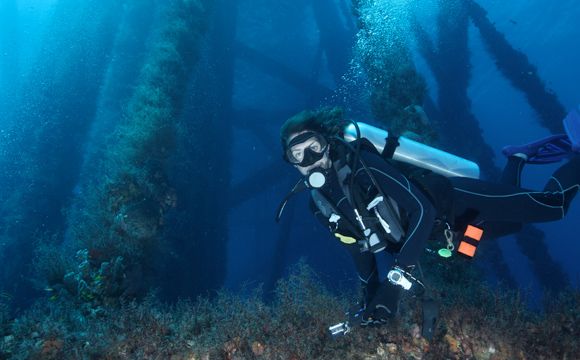
Of your list of accomplishments in your diving career, what are you most proud of?
AMBER: Completing the scientific diving course at Scripps Institution of Oceanography and obtaining my American Academy of Underwater Sciences certification was one of my most difficult, but also, most rewarding dive experiences.
EMILY: Becoming a divemaster has always been a lifelong dream of mine, especially coming from a background where diving is not only a family tradition, but a lifestyle. To respect, understand, and participate in the sport at this level, and have the ability to guide others in the water is an accomplishment I am incredibly proud of.
What would be your advice be to someone considering getting into diving?
AMBER: This may sound a bit cliche - but just do it.
EMILY: I would encourage anyone to consider diving, there is no other experience in the world like it. Diving is your first steps towards exploration of the unknown, and once you have experienced it, there is no going back. Diving gives you the ability to broaden your world and connect with nature in ways you can't even begin to imagine.
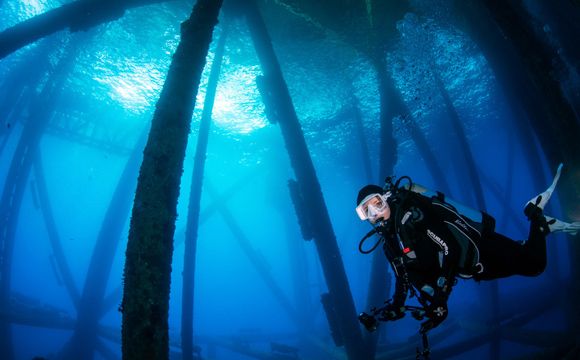
Why do you think we should all encourage more people to dive?
AMBER: People will protect what they love and that is why I want to encourage more people to dive. Once you experience the depth, complexity and beauty of the ocean, you'll fall in love. And that love gives hope to the future sustainability of our oceans.
EMILY: 70% of our earth is ocean, and much of our very existence depends on our oceans. To exist only on the land is to be one-dimensional, and I think one of the best way to care for our vast oceans is to submerse oneself through diving.
What is the favorite item in your dive bag?
AMBER: My SCUBAPRO seawing nova fins. Now that I have them, I can never use anything else. Second to that would be my GoPro. I love how my pictures and videos can extend my time underwater far beyond the limits of my air tank.
EMILY: By far my favorite item in my dive bag are my SCUBAPRO Seawing Novas. I do a lot of shore diving to reach the kelp forests in San Diego, and these fins have cut my effort in half, and allow me to cut through the water among the kelp strands with ease. Not to mention their bright color, which makes it easy for my dive buddy to spot me!
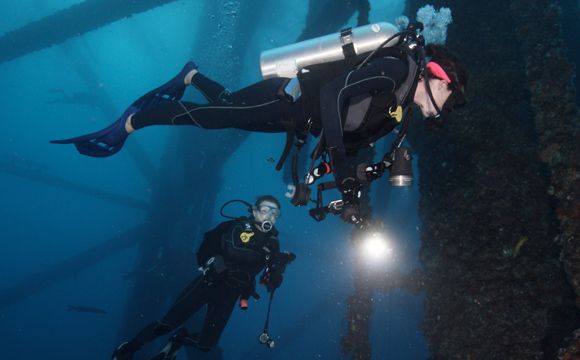
Why is SCUBAPRO your choice for dive equipment?
AMBER: I love my frameless SCUBAPRO mask. It's comfortable, durable and gives me eyes underwater!
EMILY: SCUBAPRO is my choice for diving equipment because it is quite simply the best. Confidence in your gear is key in the water, especially when you are one-hundred feet down on an active oil platform, you cannot rely on your natural human instincts, and thus you must have trust in your gear and its performance. Whenever I enter the water, I do so with the goal of blending in with my environment, and in order to fully immerse myself among the creatures around me, my gear needs to fit well, look good and perform the best- that's why I choose SCUBAPRO.